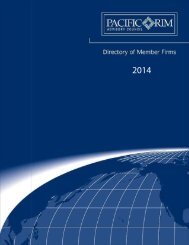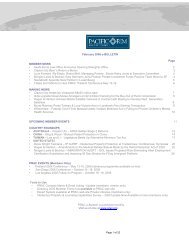The “control test “ is a very broad test. It generally applies wherea group (mean<strong>in</strong>g a person and/or his or her associates) ei<strong>the</strong>ralone or <strong>to</strong>ge<strong>the</strong>r “beg<strong>in</strong>s <strong>to</strong> control “ <strong>the</strong> trust directly or<strong>in</strong>directly.This means that changes <strong>in</strong> <strong>the</strong> ownership or control <strong>of</strong> <strong>the</strong>trustees <strong>of</strong> a non-fixed trust could cause <strong>the</strong> non-fixed trust <strong>to</strong>fail <strong>the</strong> “control test” and hence <strong>the</strong> underly<strong>in</strong>g fixed trust will beunable <strong>to</strong> claim deductions for losses and bad debts. This issue isparticularly important where it is <strong>in</strong>tended that a securitisationtrust will have a charitable or discretionary trust as itsbeneficiary. Changes <strong>of</strong> control <strong>of</strong> <strong>the</strong> beneficiary, and <strong>the</strong> trustee<strong>of</strong> <strong>the</strong> beneficiary, can affect <strong>the</strong> tax treatment <strong>of</strong> <strong>the</strong>securitisation trust itself.Taxation <strong>of</strong> trusts: Ultimate beneficiary non-disclosure taxDivision 6D <strong>of</strong> Part III <strong>of</strong> <strong>the</strong> 1936 Tax Act conta<strong>in</strong>s <strong>the</strong> provisionson ultimate beneficiary non-disclosure tax. The object <strong>of</strong> <strong>the</strong>seprovisions is <strong>to</strong> enable <strong>the</strong> Commissioner <strong>to</strong> check whe<strong>the</strong>r <strong>the</strong>assessable <strong>in</strong>come <strong>of</strong> <strong>the</strong> ultimate beneficiaries correctly <strong>in</strong>cludesany required share <strong>of</strong> <strong>the</strong> relevant net trust <strong>in</strong>come, and whe<strong>the</strong>r<strong>the</strong> net assets <strong>of</strong> <strong>the</strong> ultimate beneficiaries reflect <strong>the</strong> receipt <strong>of</strong>certa<strong>in</strong> tax-preferred amounts. Where <strong>the</strong> provisions apply, and<strong>the</strong> trustee fails <strong>to</strong> correctly identify <strong>the</strong> ultimate beneficiaries,<strong>the</strong> trustee <strong>in</strong>curs a tax liability at <strong>the</strong> rate <strong>of</strong> 48.5 percent andmay commit an <strong>of</strong>fence under <strong>the</strong> Taxation Adm<strong>in</strong>istration Act1953.The Commissioner has released Practice Statement PS 2001/12with effect from 5 September 2001 deal<strong>in</strong>g with <strong>the</strong>requirements <strong>of</strong> trustees <strong>to</strong> provide ultimate beneficiarystatements <strong>in</strong> specified circumstances. Practice Statements arenot legally b<strong>in</strong>d<strong>in</strong>g on <strong>the</strong> Commissioner, however <strong>the</strong>y aretreated as “adm<strong>in</strong>istratively b<strong>in</strong>d<strong>in</strong>g”.5.2.5 Tim<strong>in</strong>g <strong>of</strong> <strong>in</strong>terest receipts from underly<strong>in</strong>g assetInterest paid <strong>to</strong> a securitisation vehicle on its underly<strong>in</strong>g assetswill normally be assessable when received. However, if itsactivities can be characterised as ak<strong>in</strong> <strong>to</strong> that <strong>of</strong> a “f<strong>in</strong>ancial<strong>in</strong>stitution”, <strong>the</strong>n <strong>in</strong>terest <strong>in</strong>come may be recognised on a fullaccruals basis for tax account<strong>in</strong>g purposes. Taxation Rul<strong>in</strong>g TR93/27 outl<strong>in</strong>es <strong>the</strong> Commissioner’s views as <strong>to</strong> what is meant bya f<strong>in</strong>ancial <strong>in</strong>stitution. Broadly, <strong>the</strong> Commissioner believes that a“f<strong>in</strong>ancial <strong>in</strong>stitution” is “any <strong>in</strong>stitution, one <strong>of</strong> whose pr<strong>in</strong>cipalactivities is <strong>to</strong> take deposits and borrow, with <strong>the</strong> object <strong>of</strong>lend<strong>in</strong>g and <strong>in</strong>vest<strong>in</strong>g”.The Commissioner accepts that most securitisation vehicles areak<strong>in</strong> <strong>to</strong> f<strong>in</strong>ancial <strong>in</strong>stitutions and can recognise <strong>in</strong>terest <strong>in</strong>come ona full accrual basis.5.2.6 Tim<strong>in</strong>g <strong>of</strong> <strong>in</strong>terest expensesThe decision <strong>in</strong> FC <strong>of</strong> T v <strong>Australia</strong>n Guarantee Corporation 84ATC 4642 confirms that <strong>in</strong>terest deductions for a taxpayer accruefrom day <strong>to</strong> day and thus are deductible on that basis, evenwhere <strong>in</strong>terest is not payable until <strong>the</strong> end <strong>of</strong> <strong>the</strong> relevantcalculation period. This rule extends <strong>to</strong> all payments <strong>of</strong> <strong>in</strong>terestby bus<strong>in</strong>ess taxpayers, and, <strong>the</strong>refore, applies generally <strong>to</strong> allsecuritisation vehicles.5.2.7 Tim<strong>in</strong>g <strong>of</strong> swap transaction payments and receiptsThe tax treatment <strong>of</strong> any swap transaction entered <strong>in</strong><strong>to</strong> by asecuritisation vehicle will be determ<strong>in</strong>ed <strong>in</strong> accordance withIncome Tax Rul<strong>in</strong>g IT 2682 (as modified by <strong>the</strong> Draft TaxationRul<strong>in</strong>g TR 1999/D13). This provides that for bona fide swaps,payments <strong>in</strong> arrears <strong>in</strong> respect <strong>of</strong> def<strong>in</strong>ed periods are <strong>to</strong> beaccounted for on an accruals basis, whilst payments <strong>in</strong> advanceare <strong>to</strong> be deducted on a paid basis. A consistent approach is also<strong>to</strong> be adopted for receipts under swaps.5.2.8 Tim<strong>in</strong>g <strong>of</strong> ga<strong>in</strong>s and losses <strong>in</strong> respect <strong>of</strong> underly<strong>in</strong>gassetsDifferent types <strong>of</strong> <strong>in</strong>vestments and assets held by a securitisationvehicle may give rise <strong>to</strong> <strong>the</strong> recognition <strong>of</strong> assessable <strong>in</strong>come anddeductions at different times. For example, ga<strong>in</strong>s <strong>in</strong> respect <strong>of</strong>some securities with deferred yields must be recognised on a fullaccruals basis, whereas ga<strong>in</strong>s and losses <strong>in</strong> respect <strong>of</strong> securitieswhich qualify as traditional securities are not recognised until <strong>the</strong>year <strong>of</strong> <strong>in</strong>come <strong>in</strong> which such securities are disposed <strong>of</strong> orredeemed. Accord<strong>in</strong>gly, <strong>in</strong>vestments and assets held by asecuritisation vehicle should be selected and managed carefully<strong>in</strong> order <strong>to</strong> ensure that tax symmetry arises where possible.5.2.9 The taxation treatment <strong>of</strong> management feesIf <strong>the</strong> management fees payable by a securitisation vehicle havebeen calculated on an arm’s length basis, <strong>the</strong>y should bedeductible accord<strong>in</strong>g <strong>to</strong> ord<strong>in</strong>ary pr<strong>in</strong>ciples under section 8-1.However, if <strong>the</strong>y are commercially unrealistic or can be construedas be<strong>in</strong>g a payment designed <strong>to</strong> represent a distribution <strong>of</strong> pr<strong>of</strong>itra<strong>the</strong>r than an expense <strong>in</strong>curred <strong>in</strong> deriv<strong>in</strong>g <strong>in</strong>come, <strong>the</strong>re is a riskthat <strong>the</strong> fees will not be deductible. This <strong>in</strong> turn could affect <strong>the</strong>tax neutrality <strong>of</strong> <strong>the</strong> securitisation vehicle.Of particular <strong>in</strong>terest <strong>in</strong> this regard is <strong>the</strong> decision <strong>in</strong> UnitedEnergy Limited v FC <strong>of</strong> T 97 ATC 4796. The Full Federal Courtconsidered that franchise fees payable by certa<strong>in</strong> companies thatwere calculated by reference <strong>to</strong> a reasonable estimation <strong>of</strong> <strong>the</strong>amount by which <strong>the</strong> <strong>in</strong>come <strong>of</strong> those companies was likely <strong>to</strong>exceed a particular level were, <strong>in</strong> reality, ak<strong>in</strong> <strong>to</strong> payments <strong>of</strong> a31
32share <strong>of</strong> <strong>the</strong> pr<strong>of</strong>its <strong>of</strong> <strong>the</strong> companies, ra<strong>the</strong>r than costs <strong>in</strong>curredby <strong>the</strong> companies <strong>in</strong> <strong>the</strong> process <strong>of</strong> deriv<strong>in</strong>g assessable <strong>in</strong>comeand were not, <strong>the</strong>refore, deductible. The decision is similar <strong>in</strong> thisrespect <strong>to</strong> <strong>the</strong> recent Full Federal Court decision <strong>of</strong> City L<strong>in</strong>kMelbourne Limited v Federal Commissioner <strong>of</strong> Taxation [2004]FCAFC 27; taken <strong>to</strong>ge<strong>the</strong>r, <strong>the</strong> decisions highlight <strong>the</strong> potential<strong>in</strong>come tax difficulties where a management fee could beconstrued as be<strong>in</strong>g used <strong>to</strong> remove potential pr<strong>of</strong>it (or excess<strong>in</strong>come) from a securitisation structure.5.2.10 New collection proceduresUnder collection procedures <strong>in</strong>troduced from 1 July 2000, aspecial withhold<strong>in</strong>g tax is imposed where a supply is provided bya bus<strong>in</strong>ess (<strong>in</strong>clud<strong>in</strong>g <strong>the</strong> lend<strong>in</strong>g <strong>of</strong> money) that fails <strong>to</strong> quote an<strong>Australia</strong>n Bus<strong>in</strong>ess Number (ABN). If no ABN is provided, <strong>the</strong>party pay<strong>in</strong>g for <strong>the</strong> services is required <strong>to</strong> withhold 48.5 percen<strong>to</strong>f <strong>the</strong> payment.5.3 Interest withhold<strong>in</strong>g tax and securitisation5.3.1 BackgroundUnder section 128B <strong>of</strong> <strong>the</strong> 1936 Tax Act, a non-resident <strong>of</strong><strong>Australia</strong> who derives <strong>in</strong>terest from a resident must pay tax onthat <strong>in</strong>terest at a flat rate <strong>of</strong> 10 percent. This tax must bewithheld by <strong>the</strong> resident payer <strong>of</strong> <strong>the</strong> <strong>in</strong>terest.This means that an <strong>Australia</strong>n securitisation vehicle must, unlessit falls with<strong>in</strong> an exemption under <strong>the</strong> Tax Act, deduct <strong>in</strong>terestwithhold<strong>in</strong>g tax (IWT) from <strong>in</strong>terest payments <strong>to</strong> non-residentholders <strong>of</strong> those securities. S<strong>in</strong>ce an issue <strong>of</strong> securities which isliable <strong>to</strong> <strong>in</strong>terest withhold<strong>in</strong>g tax is not commercially feasible, itis important for securitisers who wish <strong>to</strong> issue <strong>of</strong>fshore <strong>to</strong> fallwith<strong>in</strong> one <strong>of</strong> <strong>the</strong> exemptions <strong>to</strong> IWT. Similarly, if a domesticissuer (<strong>in</strong>clud<strong>in</strong>g an <strong>Australia</strong>n permanent establishment <strong>of</strong> anon-resident) wishes <strong>to</strong> widen <strong>the</strong> pool <strong>of</strong> potential <strong>in</strong>ves<strong>to</strong>rs by<strong>in</strong>clud<strong>in</strong>g foreign purchasers, its securities will need <strong>to</strong> be exemptfrom IWT <strong>in</strong> <strong>the</strong>ir hands.The exemption from IWT is conta<strong>in</strong>ed <strong>in</strong> section 128F <strong>of</strong> <strong>the</strong> TaxAct and is supplemented by a number <strong>of</strong> TaxationDeterm<strong>in</strong>ations; TD1999/8-26 (<strong>in</strong>clusive); and TD2001/3.5.3.2 The current exemptions overviewInterest paid by a company on debentures will be exempt fromIWT if all <strong>of</strong> <strong>the</strong> follow<strong>in</strong>g conditions are satisfied (section128F(1)):• <strong>the</strong> company was a resident <strong>of</strong> <strong>Australia</strong> or an <strong>Australia</strong>npermanent establishment <strong>of</strong> a non-resident when it issued<strong>the</strong> debentures;• <strong>the</strong> company is a resident <strong>of</strong> <strong>Australia</strong> or an <strong>Australia</strong>npermanent establishment <strong>of</strong> a non-resident when <strong>the</strong> <strong>in</strong>terestis paid;• <strong>the</strong> issue <strong>of</strong> <strong>the</strong> debenture satisfies one <strong>of</strong> <strong>the</strong> public <strong>of</strong>fertests set out <strong>in</strong> sections 128F(3) and (4);• <strong>the</strong> issue does not fail <strong>the</strong> public <strong>of</strong>fer test under subsection128F(5), discussed at 5.3.5; and• as provided <strong>in</strong> section 128F(6) no <strong>in</strong>terest is paid <strong>to</strong> a knownassociate <strong>of</strong> <strong>the</strong> company, discussed at 5.3.3.Def<strong>in</strong>ition <strong>of</strong> <strong>in</strong>terest“Interest” is def<strong>in</strong>ed <strong>in</strong> section 128A(1AB) as follows:“Interest <strong>in</strong>cludes an amount, o<strong>the</strong>r than as set out <strong>in</strong> section26C(1):(a) that is <strong>in</strong> <strong>the</strong> nature <strong>of</strong> <strong>in</strong>terest; or(b) <strong>to</strong> <strong>the</strong> extent that it could reasonably be regarded ashav<strong>in</strong>g been converted <strong>in</strong><strong>to</strong> a form that is <strong>in</strong> substitutionfor <strong>in</strong>terest; or(c) <strong>to</strong> <strong>the</strong> extent that it could reasonably be regarded ashav<strong>in</strong>g been received <strong>in</strong> exchange for <strong>in</strong>terest <strong>in</strong>connection with a wash<strong>in</strong>g arrangement; or(d) that is a dividend paid <strong>in</strong> respect <strong>of</strong> a non-equity share.but does not <strong>in</strong>clude an amount <strong>to</strong> <strong>the</strong> extent <strong>to</strong> which it is areturn on an equity <strong>in</strong>terest <strong>in</strong> a company.”A “wash<strong>in</strong>g arrangement” for <strong>the</strong> purpose <strong>of</strong> paragraph (c) isdef<strong>in</strong>ed <strong>to</strong> mean an “arrangement under which <strong>the</strong> title <strong>to</strong> asecurity is transferred <strong>to</strong> a resident shortly before an <strong>in</strong>terestpayment is made where <strong>the</strong> sole or dom<strong>in</strong>ant purpose <strong>of</strong> <strong>the</strong>arrangement is <strong>to</strong> reduce <strong>the</strong> amount <strong>of</strong> withhold<strong>in</strong>g tax payableby a person”.Sections 128A(1AC)-(1AF) provide clarification <strong>of</strong> whatconstitutes <strong>in</strong>terest. This <strong>in</strong>cludes a discount on a security and alump sum payment made <strong>in</strong>stead <strong>of</strong> payment on <strong>in</strong>terest. If alender assigns a loan, or <strong>the</strong> right <strong>to</strong> <strong>in</strong>terest under a loan, anypayment from <strong>the</strong> borrower <strong>to</strong> <strong>the</strong> assignee that represents anamount that would have been <strong>in</strong>terest had <strong>the</strong> assignment nottaken place, is <strong>to</strong> be taken as <strong>in</strong>terest. Also, if a person acquiresa security on a cum-<strong>in</strong>terest basis, any payment by <strong>the</strong> issuer <strong>to</strong>that person that would have been <strong>in</strong>terest if <strong>the</strong> acquisition hadnot taken place is taken <strong>to</strong> be a payment <strong>of</strong> <strong>in</strong>terest.






